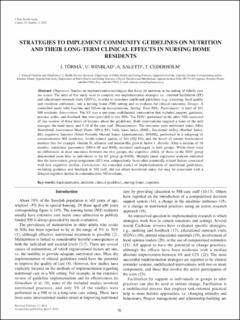Strategies to implement community guidelines on nutrition and their long-term clinical effects in nursing home residents
Journal article

Åpne
Permanent lenke
https://hdl.handle.net/11250/3059278Utgivelsesdato
2015Metadata
Vis full innførselSamlinger
Originalversjon
Törmä, J., Winblad, U., Saletti, A. & Cederholm, T. (2015). Strategies to implement community guidelines on nutrition and their long-term clinical effects in nursing home residents. The journal of nutrition, health & aging, 19(1), 70–76. https://doi.org/10.1007/s12603-014-0522-4Sammendrag
Objectives
Studies on implementation techniques that focus on nutrition in the setting of elderly care are scarce. The aims of this study were to compare two implementation strategies i.e., external facilitation (EF) and educational outreach visits (EOVs), in order to introduce nutritional guidelines (e.g. screening, food quality and mealtime ambience), into a nursing home (NH) setting and to evaluate the clinical outcomes.
Design
A controlled study with baseline and follow-up measurements.
Setting
Four NHs.
Participants
A total of 101 NH residents.
Intervention
The EF was a one-year, multifaceted intervention that included support, guidance, practice audits, and feedback that were provided to two NHs. The EOVs performed at the other NHs consisted of one session of three hours of lectures about the guidelines. Both interventions targeted a team of the unit manager, the head nurse, and 5–10 of the care staff.
Measurements
The outcomes were nutritional status (Mini Nutritional Assessment-Short Form, MNA-SF), body mass index (BMI), functional ability (Barthel Index, BI), cognitive function (Short Portable Mental Status Questionnaire, SPMSQ, performed in a subgroup of communicative NH residents), health-related quality of life (EQ-5D), and the levels of certain biochemical markers like for example vitamin D, albumin and insulin-like growth factor 1.
Results
After a median of 18 months, nutritional parameters (MNA-SF and BMI) remained unchanged in both groups. While there were no differences in most outcomes between the two groups, the cognitive ability of those in the EOV group deteriorated more than in individuals in the EF group (p=0.008). Multiple linear regression analyses indicated that the intervention group assignment (EF) was independently from other potentially related factors associated with less cognitive decline.
Conclusion
An extended model of implementation of nutritional guidelines, including guidance and feedback to NH staff, did not affect nutritional status but may be associated with a delayed cognitive decline in communicative NH residents.